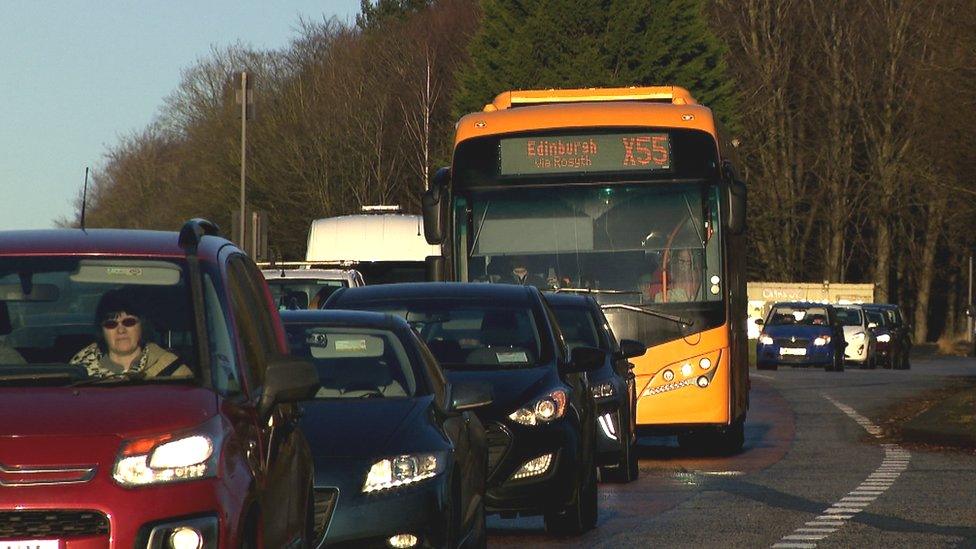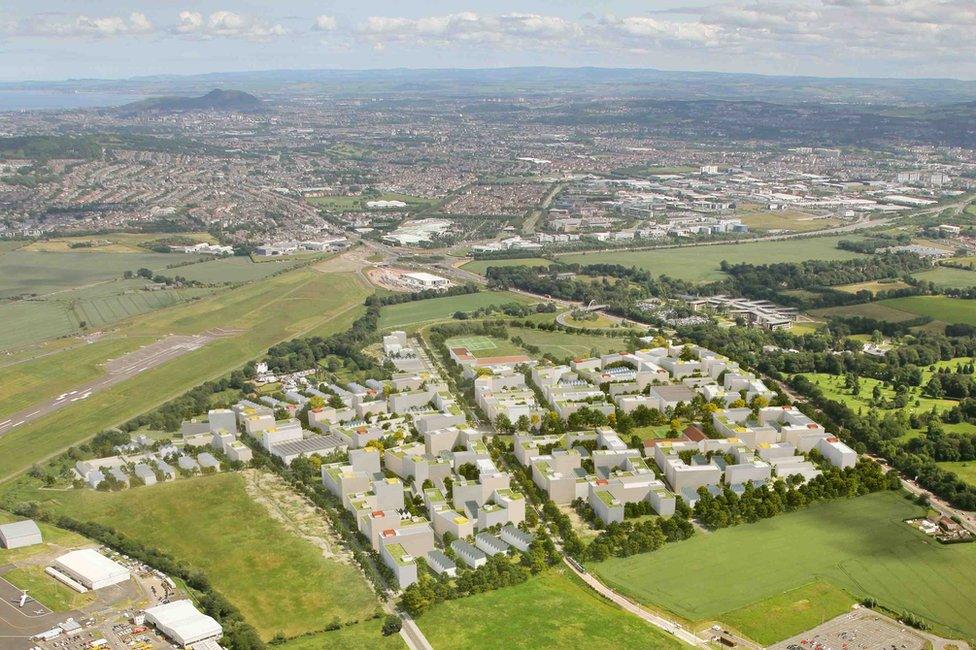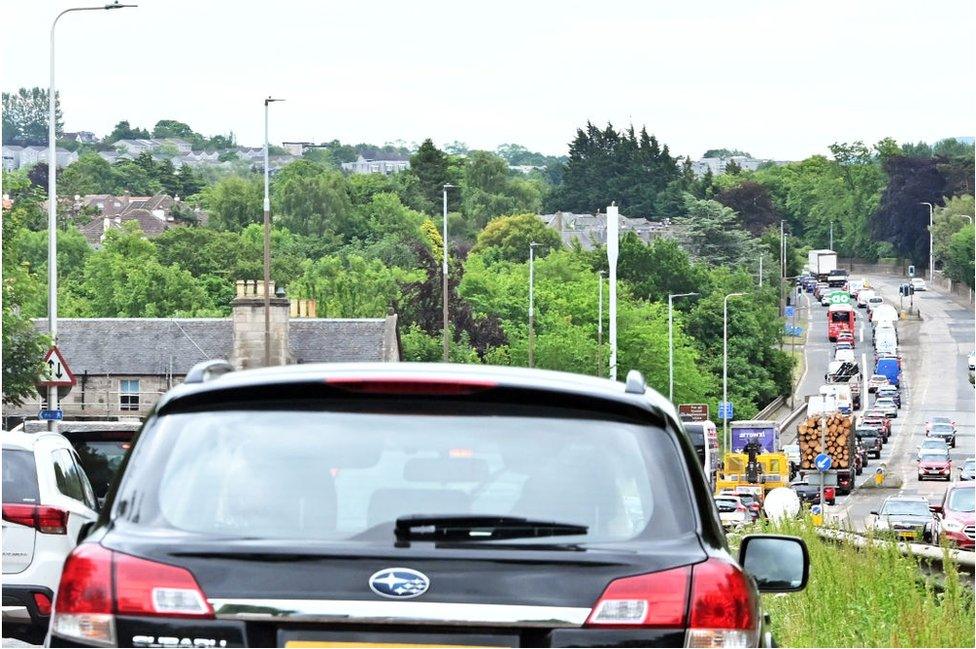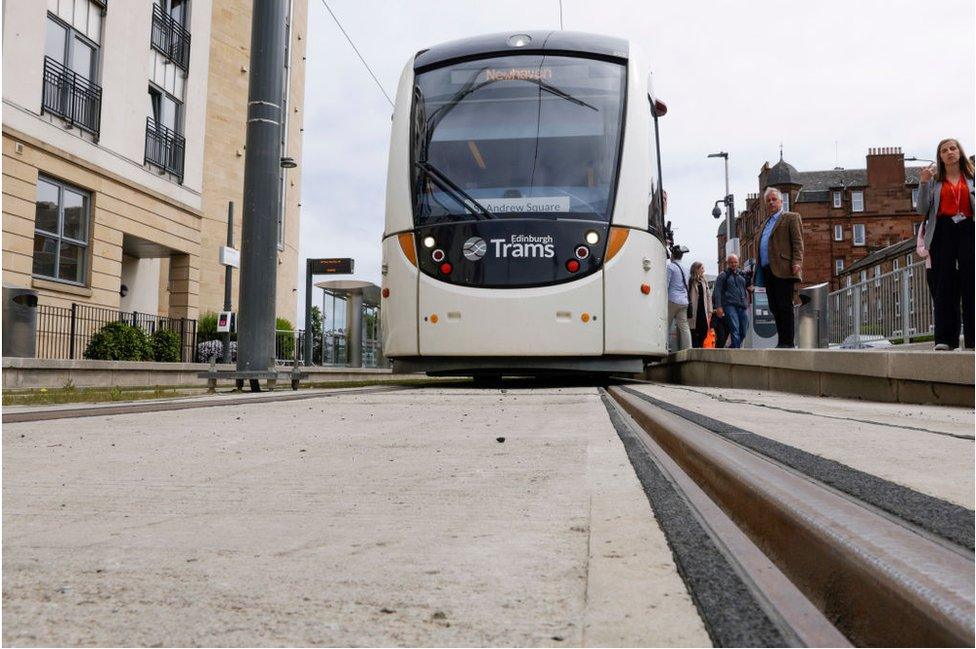What are Edinburgh's bold new plans for congestion?
- Published
- comments

Edinburgh's congestion has increased since the pandemic lockdowns
Edinburgh is a growing city with a congestion problem.
The volume of traffic has bounced back from the pandemic in a way that public transport use hasn't.
The city council has previously set a target of reducing car use by 30% , externalbefore the end of the decade.
The question is - how can it do that?
This week, the City of Edinburgh Council launched bold plans for its future.
Future Streets - a circulation plan for Edinburgh, external set out a reworking of how space is allocated on the city's streets, focusing on neighbourhoods, key transport corridors and the city centre.

Councillor Scott Arthur feels the city has a duty to meet its climate obligations
The city's transport convener favours what he called a stick and carrot approach.
Councillor Scott Arthur says Edinburgh is lagging behind other big cities and has a moral duty to meet its climate obligations.
Opponents say have questioned whether the council's ambition outstrips its budget.
Here are the five biggest things that have got people talking in the city.
City centre traffic ban

The idea is to re-route general traffic around some of the capital's most famous streets
One proposal is to stop vehicles travelling through the city centre.
The council stressed it wouldn't be a complete ban - exemptions would apply for things like business deliveries and cars could still access the restricted area.
The idea, they say, is to re-route general traffic around some of the capital's most famous streets like the Grassmarket and parts of the Royal Mile where pedestrians would be given priority.
Council officers are considering whether to follow the "big bang" approach taken in the Belgian city of Ghent where similar restrictions were introduced over a single weekend.
As a first step the Cowgate will be closed to traffic this year and will not re-open if the experiment is deemed to be a success.
The campaign group Living Streets says the plans would make for safer, more pleasant streets but has warned against simply shifting congestion elsewhere.
That concern is reflected in the modelling showing that public transport delays on Lothian Road would increase by 40% if city centre restrictions were introduced.
Critics of the plan - which would also include late night and weekend parking restrictions - say it reinforces the council's "anti-car" agenda.
Improved bus service

An artist's impression of West Town at Edinburgh Airport
Nearly two million passengers use the bus and tram in Edinburgh every week.
Increasing that number at the expense of using the car is central to the council's strategy.
An illustration of that lies in the plans to build a housing development "the size of Falkirk" near Edinburgh airport by the end of the decade.
On that route council officers say an extra 55 buses an hour would be needed to properly connect people with the city centre.
More generally all-day, seven-day-a-week bus lanes are among the measures being considered with the aim of improving journey times by 25%.
Edinburgh Council had earmarked a share of £500m of Scottish government bus priority funding but that investment, announced in 2019, has now been paused.
Describing that decision as "a hammer blow", transport convener Scott Arthur says they'll now explore alternative ways of delivering improved bus services - "a must" he insists before consideration is given to revisiting an old idea.
Congestion charging?

In 2005 Edinburgh residents voted overwhelmingly to reject a proposal to introduce a £2 charge for driving into the city. Nearly 20 years on, the basic concept is once again on the lips of councillors.
But the transport convener says the move away from fuel duty could present an opportunity to introduce a "pay as you drive" alternative.
"It would be much more focused on vehicles coming into Edinburgh from surrounding local authorities where the drivers were choosing not to use a viable alternative to public transport," said Mr Arthur.
"It's a stick to encourage people to take advantage of the carrot of better public transport which would be there."
However, he says the prospect of road pricing in Edinburgh is still years away and would be contingent on improvements to public transport.
"It would be immoral for us to charge people for coming into the city by car when there's no viable alternative in place for them right now.
"We need that investment in place first and then we'll follow up with a congestion charge if it's needed."
Tram extension

The council believes it has learned lessons after the successful launch of the Newhaven tram service
Another proposal involves a project with a chequered past.
"A litany of avoidable failures" were responsible for the original line being delivered years late and vastly over budget according to Lord Hardie's public inquiry.
Edinburgh Council insists the tram extension to Newhaven completed successfully last year shows that lessons have been learned.
Now a further extension is being proposed that would connect Granton in the north of the city with Edinburgh Royal Infirmary in the south.
The proposals are at an early stage but current estimates suggest it could take around 10 years to complete at a cost of £2bn.
That's considerably more expensive than earlier phases of the project which raises the question of who pays?
Edinburgh Council is hoping for considerable support from the Scottish government and describe discussions so far as positive. Officials also say that public/private funding models need to be explored.
Cycling / Devil in the detail?

A proposed new tram route would affect a well-used cycle path
Along with public transport, active travel is the other central plank of the city's transport strategy.
The council highlights safer cycling as one of the benefits of its proposal to restrict traffic in the city centre and plans for expanding the city to the west involve a significant upgrade to the cycling infrastructure.
The proposed tram extension, however, offers an example of the difficulty often found in the detail of large transport projects.
One of the suggested new routes would take trams along the Roseburn path which is currently home to lots of off-road bike traffic.
The tram development would result in cycling on that section being "discouraged" with segregated cycling facilities offered instead on nearby roads.
That's upset many local cyclists including Ian Maxwell from the campaign group Spokes.
"It will either deter people from using bikes or force them onto the road," he said.
"At a time when Edinburgh is planning lots of really interesting and innovative measures to improve the provision for cyclists, it seems really ironic that it will come alongside a plan that will cut a really important chunk of the network."
The next phase for the trams proposal will be a public consultation in the spring. The council can expect plenty of feedback.